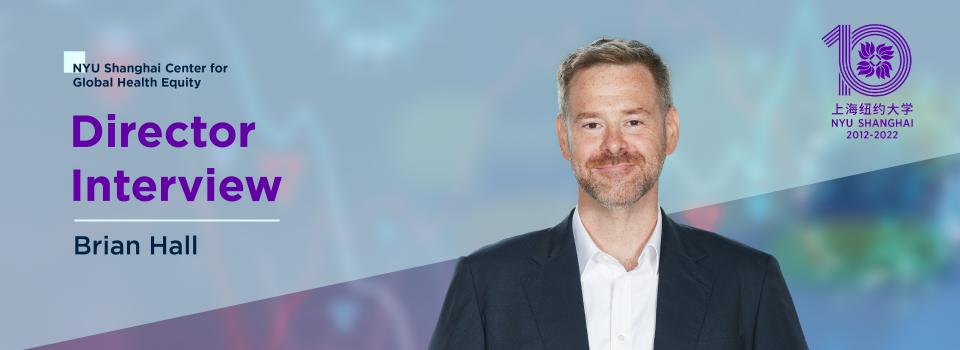Apr 19 2023
Published by
yl10038

Established in 2022, and led by Professor of Global Health Brian Hall, NYU Shanghai Center for Global Health Equity works to reduce health disparities by improving the health of diverse populations through research. Hall shared with us about the center’s growth and focus, and the faculty team’s ongoing projects. “We want to make sure our work has high levels of cultural relevance and humility and is grounded in the lived realities of the people that are experiencing the health concern,” he said.
Tell us about the center’s mission.
Our center serves society by engaging in research with the aim of improving the health of diverse populations across the lifespan - from children to elders - by reducing health disparities globally. In our research, we pay attention to including groups that might traditionally be neglected or not considered major beneficiaries of public health interventions, such as migrant workers and other vulnerable communities. We utilize emerging technology to address health disparities globally through digital health interventions. We aim to further develop these interventions to improve health systems and care delivery, and use it to address issues associated with infectious diseases as well.
How does the center engage with students?
Our mission also lies in igniting students’ passion, not just in the classroom, but through applied research programs. NYU Shanghai students are eager to contribute to social issues, but oftentimes they don’t have the mechanism in place to directly manifest their ideas. Thus, I’ve been working with students to channel the excitement, energy, and passion into applied research that enables them to do something that really informs the dialogue on the topics they care about. Public health would be a good choice as it’s related to everyone. Our Center has been actively involving research trainees at all levels - from undergraduate to postdocs - and guiding them as they navigate their way to make contributions through their work.
Who makes up the center? What is the strength of this team?
Public health is team science. So far, we’ve brought together 23 faculty from across the NYU network, and 12 additional faculty from across China and the world. Their expertise covers mental health, health disparities, epidemiology, public health, urban planning, medical anthropology, psychology, social policy, and even interactive media arts. People joined this center as they recognize our mission and hold the same research interests, so synergies have been naturally created. This diverse group of scholars positions us as a key platform to carry on research both locally and globally.
Interdisciplinary thinking is highly valued in our studies. If we aim to ask and answer some of the most important questions that relate to human health and public health, different perspectives allow us to think critically and collectively, in ways that generate new knowledge and innovation. It’s critical to have these perspectives in our studies as we want to make sure our work has a high level of cultural relevance and humility and is grounded in the lived realities of the people that are experiencing the health concern.
Interdisciplinary collaborations also allow us to apply mixed methodologies in research. For example, by combining qualitative and quantitative methods in the work, we get to understand different angles of the same problem, which I believe leads to higher levels of rigor and relevance, not only to the scientific community, but also to the communities we aim to serve through our work.
What projects are the center currently focused on?
Two major areas that we’re leading on the edge at this point are digital health technology studies and epidemiological investigations. We’re collaborating with the World Health Organization’s (WHO) Western Pacific Regional Office to organize a digital mental health working group across the region. WHO has been building a new framework in the Western Pacific region that articulates a vision of including everyone in health research and services. Our team has been leading research and policy support on digital mental health to guide these efforts. Our team has led the first trials of the WHO digital mental health intervention Step-by-Step among Chinese young adults and international migrants - populations facing emergent mental health challenges.
Epidemiology is the study of the distribution of illness and disease in a population. Our center has engaged in projects throughout the COVID-19 pandemic to identify risk and protective factors. We’ve carried out epidemiological investigations to look at how individuals are nested within their community, social relationships, and physical and built environmental factors, and try to understand how these factors are associated with a risk or protection for various illnesses.
Last year we launched a longitudinal project in Shanghai to examine COVID-19’s impacts on different populations’ mental health and well-being. A large-scale data collection of over 3,000 people was conducted to quantify their mental health and well-being needs. We especially paid attention to including vulnerable populations such as migrant workers and elderly people in the data.
Currently, there’s also an ongoing follow-up study to track individuals that we had initially contacted and see how their health and well-being have changed over time, and what factors might have contributed to that. This Shanghai study has become a coalescing vehicle to get us all working and thinking together about what’s important for the health of the public and how we can build more resilient and responsive cities in China.


